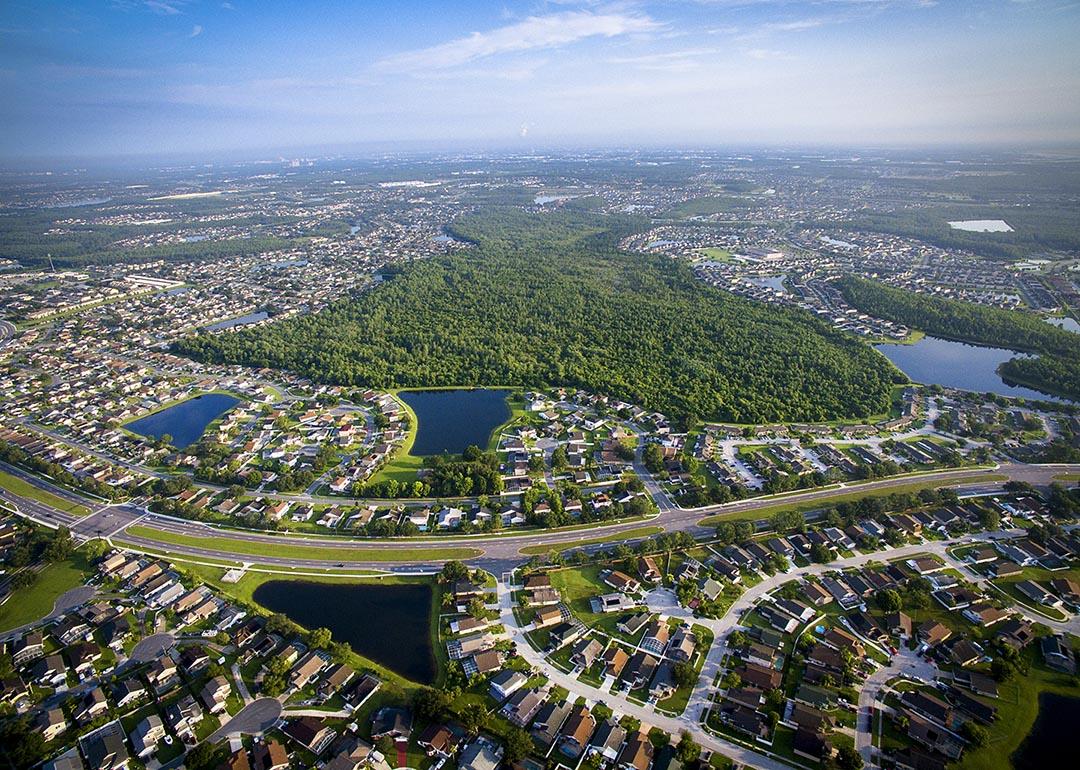
Which small US cities are rising hotspots for financial prosperity?
This story was produced by MoneyGeek and reviewed and distributed by Stacker Media.
Which small US cities are rising hotspots for financial prosperity?
Small cities offer a sense of small-town community while providing access to big-city resources. They also combine the economic advantages of a lower cost of living with the lifestyle benefits of urban proximity, diverse culture and recreation.
MoneyGeek analyzed economic growth and prosperity indicators for 211 cities with populations of 63,000 to 100,000 to uncover which small cities in America are up and coming. Small cities in Florida rank at the top of the list, and more often than not, people moving to or living in the highest-ranking cities are staying there.
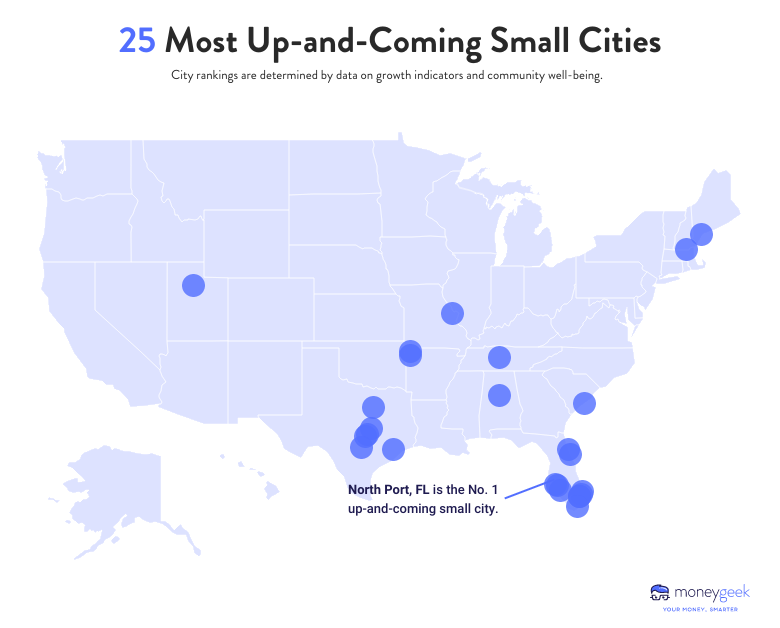
Key findings
- North Port, Florida, is the No. 1 up-and-coming small city, seeing increases of 28% in population and 43% in housing units since 2017. Median household income is $78,587, up 46% over the same period.
- Florida and Texas show significant growth potential and are home to 20 and 14 cities of the most up-and-coming cities, respectively. Texas cities, in particular, show promise in housing development and new businesses.
- Kissimmee, Florida, leads in attracting newcomers, ranking No. 1 in net migration, No. 36 in average annual GDP growth and No. 31 in five-year housing unit change.
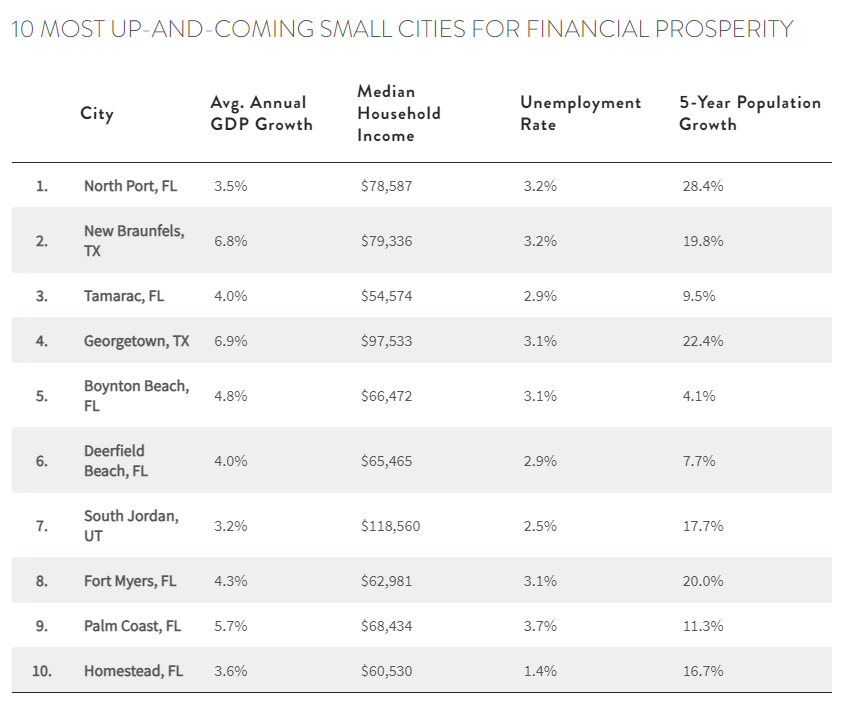
Most up-and-coming small cities in the U.S.
North Port, Florida, and New Braunfels, Texas, take the No. 1 and No. 2 spots in our study, setting the pace for growth and prosperity. This pattern of expansion is mirrored across the region, with cities like Tamarac, Florida, and Georgetown, Texas, also earning their spots among the top contenders. Just one Western city ranks in the top 10: South Jordan, Utah.
Southern Florida cities like Tamarac, Boynton Beach, Deerfield Beach and Homestead lead with high population growth between 2017 and 2022 and high average annual GDP growth. Homestead's 46% spike in the number of housing units makes it the No. 2 for that measure, while Boynton Beach's property crime per 100,000 residents (492) was the fourth-best of the cities analyzed.
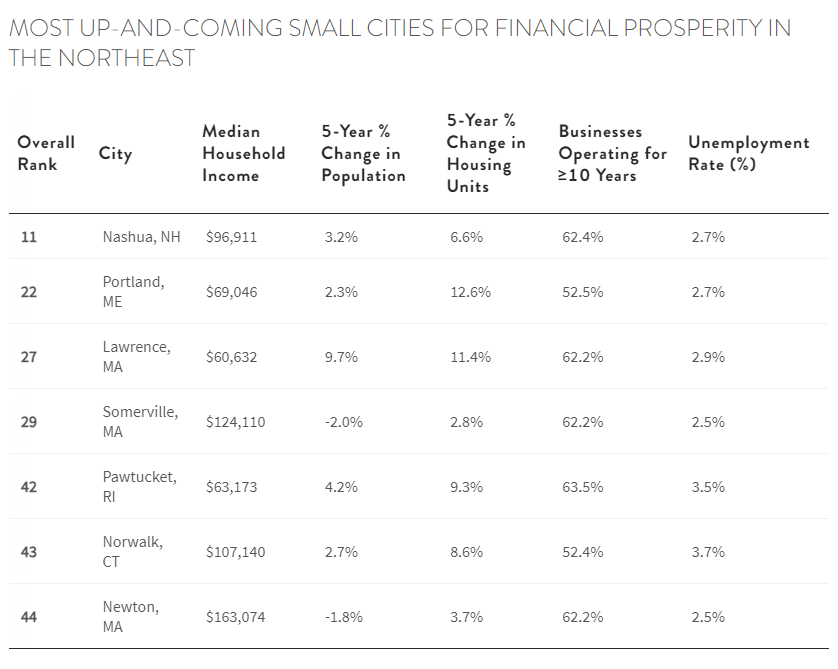
Northeast
Despite having the fewest number of cities included (28), one-quarter of these Northeastern small cities rank in the top 50. Three of these are located in Massachusetts — Lawrence, Somerville, Newton — and the remaining are Nashua, New Hampshire; Portland, Maine; Pawtucket, Rhode Island; and Norwalk, Connecticut. In these cities, income growth surpassed 22% over five years, with Newton being an exception at 13%. Additionally, most of the businesses in these cities have been in business for more than 10 years and (excluding Lawrence) experience relatively low crime rates.
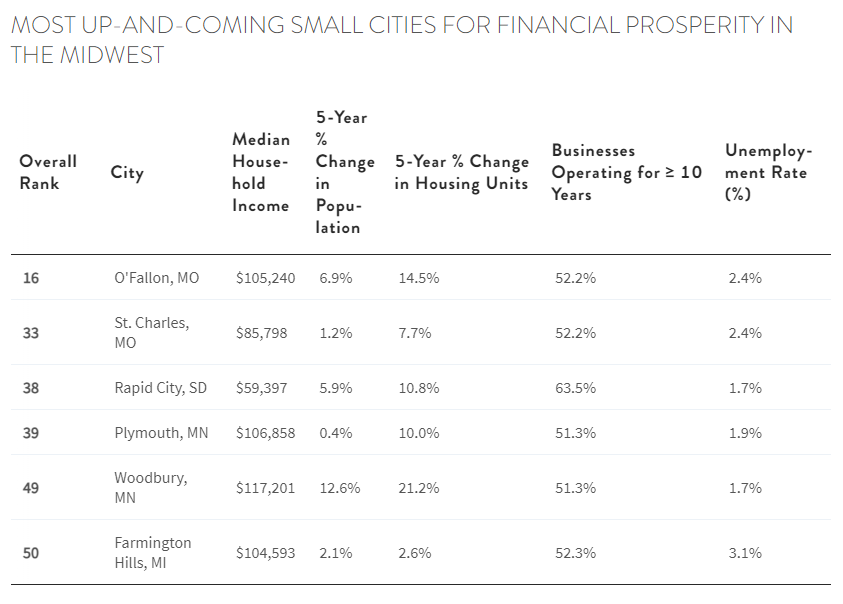
Midwest
Among the study's top 10 cities, the Midwest is represented by six, including Plymouth and Woodbury, Minnesota; O'Fallon and St. Charles, Missouri; and Rapid City, South Dakota. These cities excel with low unemployment rates, ranking them in the top 30. Notably, O'Fallon, Plymouth and Woodbury report lower crime rates, with Woodbury also experiencing a significant 13% population growth. Rapid City is recognized for its business longevity, with 64% of businesses operating for 10 years or longer.
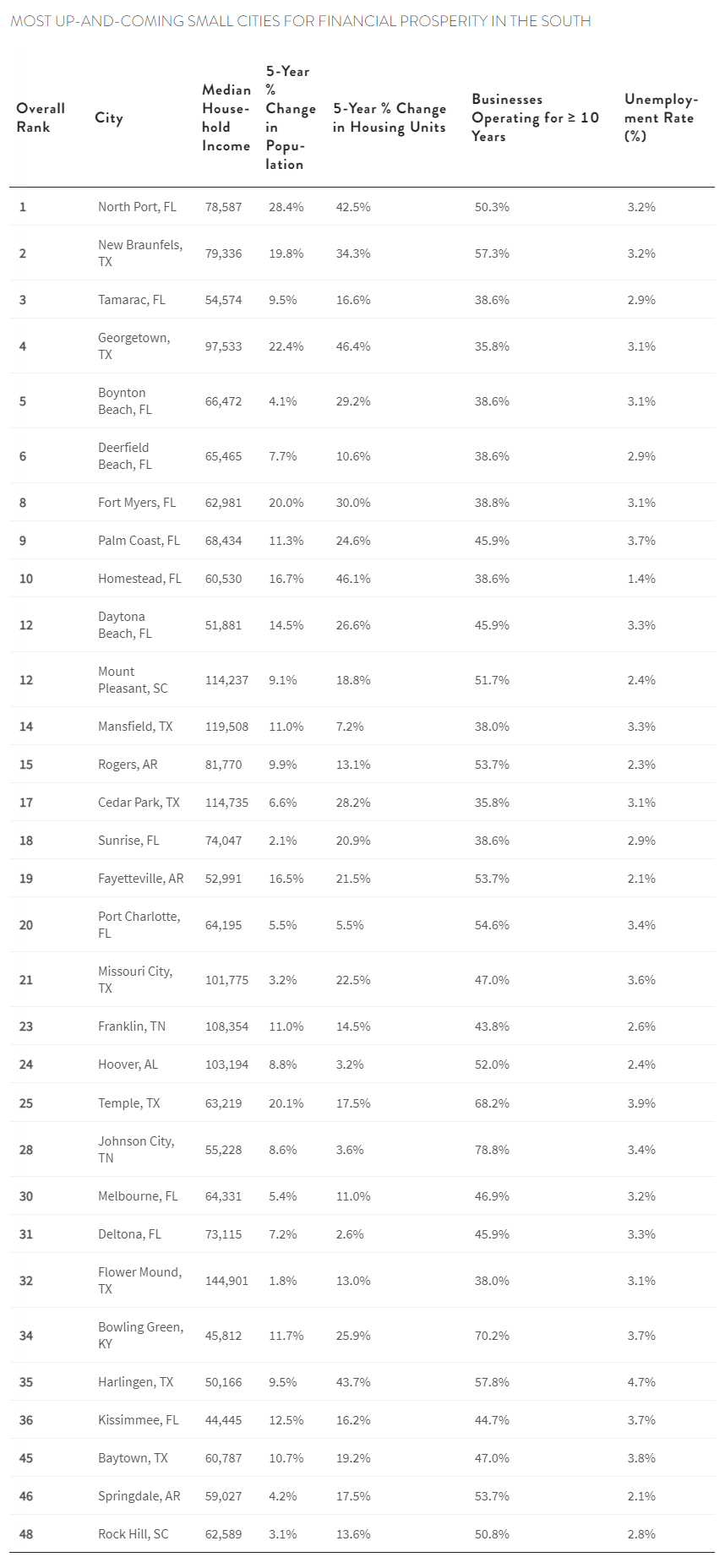
South
Southern cities — nearly half of those considered — feature prominently in the top 50, driven by Florida's strong performance and complemented by cities across other Southern states such as Mount Pleasant, South Carolina; Rogers, Arkansas; Franklin, Tennessee; and Hoover, Alabama. These cities are part of a regional trend that sees strong housing growth, led by Georgetown, Texas.
Kissimmee, Florida, tops the net migration category with a significant influx of residents (7,000 new residents in 2022). Johnson City, Tennessee, also stands out for doubling its number of new businesses since 2022.
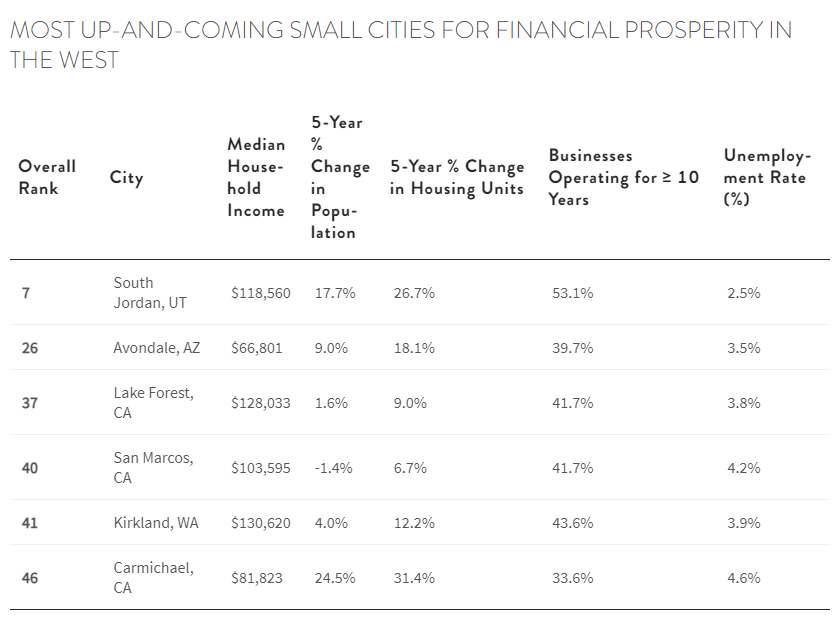
West
Despite leading in the number of small cities analyzed, the West ties with the Midwest for the lowest number of cities that rank in the top 50. South Jordan, Utah, stands out in the top 10 with a 27% increase in housing growth and a low violent crime rate (66 reports per 100,000 people).
Avondale, Arizona; Lake Forest, California; San Marcos, California; and Kirkland, Washington, follow as the region's best, with impressive housing growth and rich entertainment options. Carmichael, California, stands out for its 25% population increase and 31% increase in housing units between 2017 and 2022.
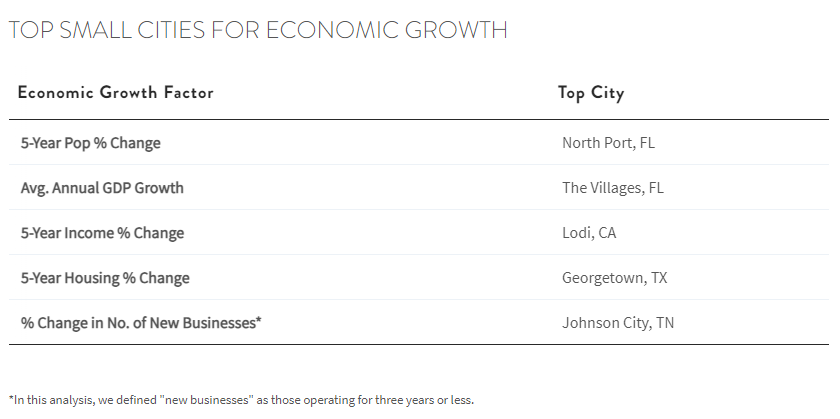
Top small cities for economic growth
Cities like North Port, Florida, and Georgetown, Texas, showcase impressive gains in population and housing. Over the five years analyzed, North Port's population surged by 28%. Georgetown followed closely with a 22% increase in population while also leading in housing growth with an impressive 46% rise. New Braunfels, Texas, shows economic growth with a 7% average annual GDP growth, while Lodi, California, saw an increase of 70% in median household income between 2017 and 2022, resting at $88,440.
When it comes to business growth, Johnston, Tennessee, ranks highest with new businesses (those three years or younger), more than doubling its number of businesses between 2018 and 2021. Additionally, several Midwestern cities saw high percentages of businesses operating for 10 years or longer, particularly in Illinois, Minnesota, Oklahoma, Ohio, Wisconsin and Iowa.
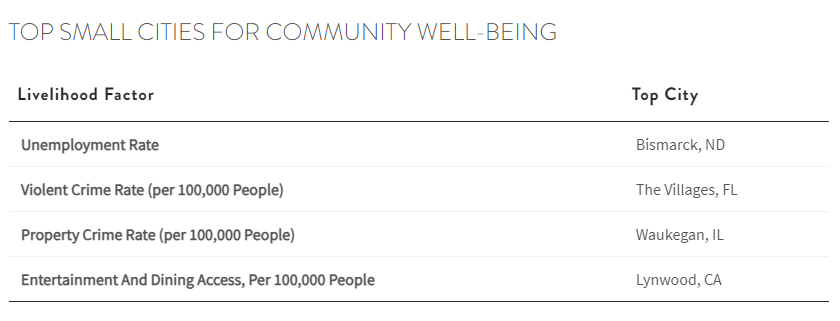
Top cities for community well-being: A snapshot of unemployment, crime and access to entertainment and dining
There's more to financial prosperity than economic growth indicators. To capture a better picture of the appeal of these cities, we also considered livelihood factors such as unemployment rates, crime rates and entertainment and dining access.
Lynwood and Redondo Beach in California top our list for entertainment and dining options, with 654 and 608 related businesses per 100,000 people, respectively. Across the country, The Villages and Weston in Florida lead with the lowest violent crime rates of 27 and 40 per 100,000. Economic stability is highlighted in the counties where Bismarck, North Dakota, and Ellicott City, Maryland, are located, with unemployment rates at approximately 1%.
What to consider before moving to a growing small city
If small-city life appeals to you, there are several steps you can take to arm yourself with the financial knowledge to navigate relocation and buying a home smoothly.
- Make safety a factor
Researching the safest small cities can help you find a location where you feel secure and at ease. - Consider the cost of living
Analyze the cost of living in your chosen city to see how relocating might affect your budget. - Calculate your new mortgage costs
Use a mortgage calculator to get a clear picture of your monthly housing costs and find the most financially savvy home loan. - Manage your credit score
Homeownership can be more affordable in your new city with a better credit score, opening the door to lower mortgage rates. Understanding how credit scores are calculated and how your debt-to-income ratio plays a part can help you manage this financial identifier.
Methodology
To determine which up-and-coming small cities are the most promising for financial growth, MoneyGeek analyzed data for 211 metro areas across the U.S. with populations between 65,000 and 100,000. We compared these metros across 11 key metrics on growth indicators and community well-being.
- Growth Indicators: We considered changes in population, income and housing units (2017–2022), average annual GDP growth rate change (2020–2022) and change in the number of new businesses operating for three years or less (2018–2021). Additionally, we considered the percentage of businesses operating for 10 years or longer (2021) and net migration (2022). Data utilized comes from the Census Bureau's one-year 2022 American Community Survey, the Bureau of Economic Analysis' Gross Domestic Product by County dataset and the Census Bureau's Annual Business Surveys, which collect data at the county level.
- Community Well-Being: This study examines unemployment rates from the Bureau of Labor Statistics' Local Area Unemployment Statistics (LAUS), the density of entertainment, dining, and recreation venues per 1,000 residents based on the Census Bureau's 2021 County Business Patterns Survey, and crime rates per 100,000 residents from the FBI's 2022 Crime Data Explorer database and NeighborhoodScout.com.
Each metro was ranked in every metric, which was then used to calculate a final ranking score through a weighted average. Each metric was given full weight except for percentage change in the number of new businesses, percentage of businesses operating for 10 years or more, net migration, violent crime and property crime — all of which were half-weighted. The metro with the highest final ranking score ranks as the most up-and-coming small city.



